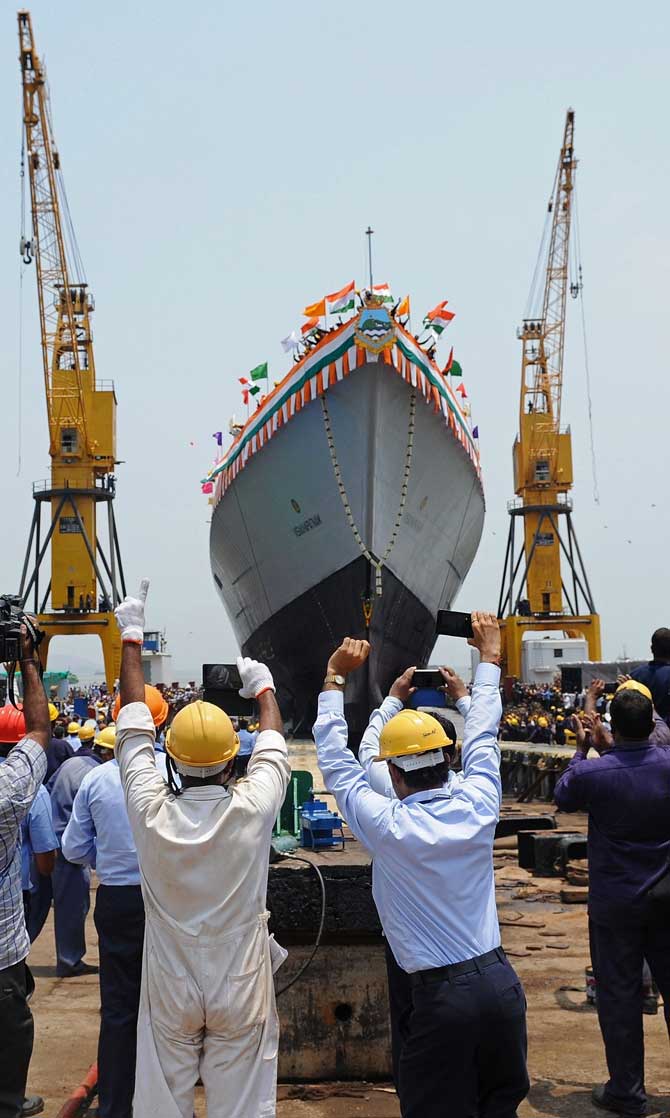The Indian Navy's new and biggest destroyer, Visakhapatnam, which has enhanced capacity to operate in nuclear, biological and chemical atmosphere, was put to the sea at a function in Mumbai
The Indian Navy's new, biggest and first stealth destroyer, INS Visakhapatnam, which has enhanced capacity to operate in nuclear, biological and chemical atmosphere, was put to the sea at a function here on Monday, officials said.
ADVERTISEMENT
It was ceremonially launched by Minu Dhowan, wife of naval chief C.K. Dhowan, in the presence of top naval, defence and civilian officials.
 Workers cheer as INS Visakhapatnam, the first Indian Navy P15-B stealth destroyer, is launched in Mumbai on Monday. Pic/AFP
Workers cheer as INS Visakhapatnam, the first Indian Navy P15-B stealth destroyer, is launched in Mumbai on Monday. Pic/AFP
The 163-metre long 7,300-tonne Visakhapatnam is the first of the four follow-on warships of the Kolkata Class Project 15A, designed indigenously and will give a significant boost to India's maritime capabilities when it joins Indian Navy in 2018.
The Kolkata Class did not have a full-fledged Total Atmosphere Control System (TAC), which is included in Visakhapatnam, according to an official.
The TAC system provides a capability of almost endless operating in a fall-out region whether it is a nuclear, chemical or biological, because the complete air taken inside is through nuclear, biological and chemical filters barring the machinery compartment, where wearing specialized masks would be mandatory.
Visakhapatnam is equipped with several indigenous weapon systems and an Israeli Multi Function Surveillance Threat Alert Radar (MF-STAR), which would provide targeting information to the 32 Barak 8 long-range surface-to-air-missiles aboard.
The Barak 8 missiles, being developed jointly by India and Israel, are being integrated into the Indian Navy's new destroyed INS Kolkata and shall be test-fired in October.
Besides, Visakhapatnam will also carry eight BrahMos missiles, a 127mm main gun, four 30mm rapid fire guns, and achieve speeds of over 30 knots with a maximum endurance of 400 nautical miles at an economical speed of 14 knots.
Fitted with a sophisticated Ship Data Network, an Automatic Power Management System and a Combat Management System, all information critical to operate the ship is made available to key officers through the SDN which the Indian Navy terms a "data information highway".
It incorporates state-of-the-art weaponry, sensors, supersonic surface-to-surface missiles, enabling it to engage shore-based and naval surface targets at long range.
The ship also has advanced air defence capability, designed to counter the threat of enemy aircraft and anti-ship cruise missiles and would revolve around the vertical launch and long range surface-to-air missiles system.
The ship can house a complement of 250 sailors and 50 officers, and has been designed by the Indian Navy's Directorate of Naval Design, as part of the country's commitment towards indigenization.
Visakhapatnam has been built by the Mazagaon Docks Ltd., India's premier warship building yard where four other destroyers and six submarines are being constructed.
 Subscribe today by clicking the link and stay updated with the latest news!" Click here!
Subscribe today by clicking the link and stay updated with the latest news!" Click here!






